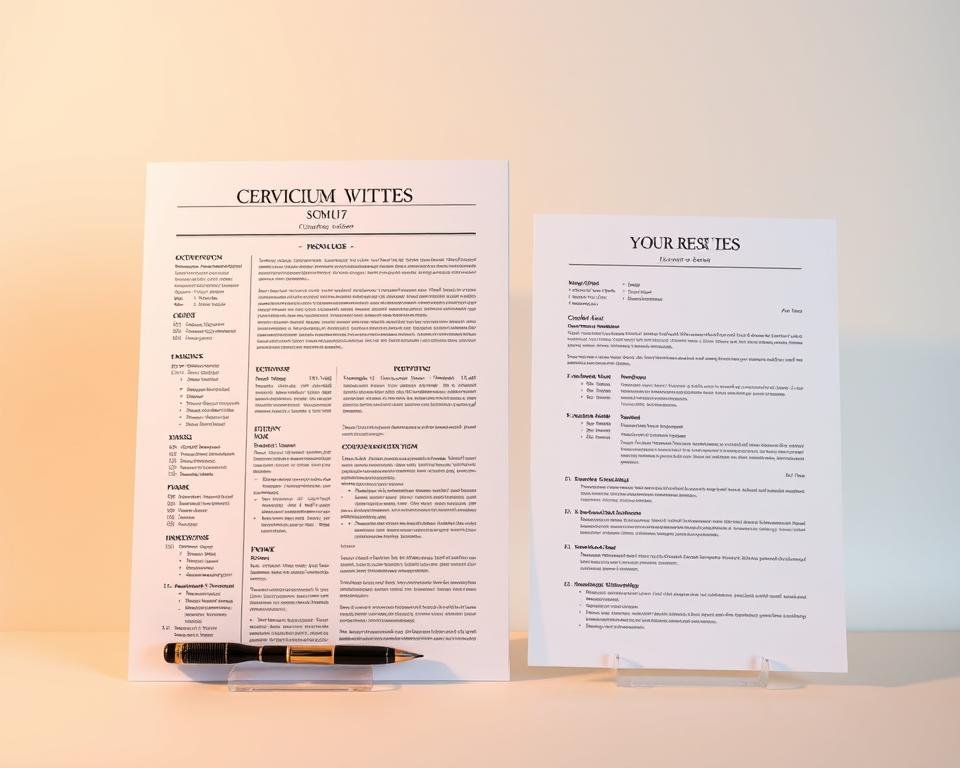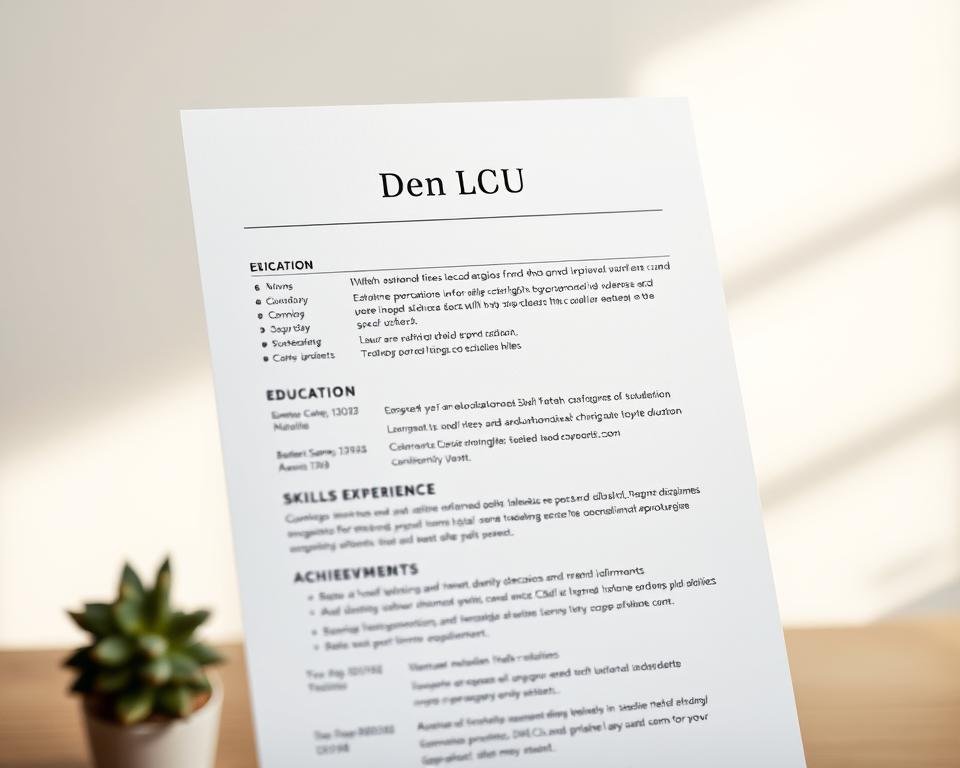Student CV Guide: Optimize Your Resume for US Job Search

Did you know over 70% of employers in the United States glance at resumes for under 30 seconds? This fact shows how crucial a well-made Student CV is. It must grab attention fast and effectively. As students move from school to work, finding a job can be tough, thanks to the competitive job market.
In this guide, we'll share key tips for creating a standout Student CV for the US job market. We'll teach you how to make your resume shine, highlighting your skills and experiences. The right Student CV can significantly boost your chances of getting hired, showing employers why you're the best fit.
- Understanding the Importance of a Student CV
- Key Differences Between CVs and Resumes
- Essential Elements of a Student CV
- Tips to Write a Student CV for Jobs in United States
- The Role of Keywords in CV Optimization
- Crafting a Compelling Student CV
- Formatting Guidelines for a Professional Appearance
- Utilizing a Student CV Template
- Understanding the US Job Market for Students
- Stand Out with Your Student CV in the US
- Job Search Tips for Students
Understanding the Importance of a Student CV
A well-crafted student CV is key to showing off your academic wins, skills, and experiences. It's more than just a piece of paper; it's a detailed summary for employers or internship coordinators to review. As you start applying for jobs in the US, having a strong resume is crucial.
The value of a student resume is huge in a competitive job market. Employers like clear, structured resumes that show off your education and achievements. A good CV also highlights your practical experience, like extracurricular activities and volunteer work.
Also, a well-made student CV helps you network. Sharing your CV can lead to connections through alumni or professional contacts. Plus, it makes it easier to get references from teachers or supervisors, boosting your job prospects.

Key Differences Between CVs and Resumes
It's important to know the difference between CVs and resumes for job seekers. A CV, or curriculum vitae, lists your academic achievements, research, and publications. It's a detailed document that can be several pages long.
A resume, on the other hand, is a brief summary for job applications. It focuses on your most relevant experiences and skills. This makes it perfect for highlighting your qualifications in a concise way.

Choosing between a CV and a resume depends on your career goals and the job you're applying for. CVs are best for academia, research, and international jobs. Resumes are better for private industry and most U.S. jobs. Knowing the right format can boost your job application success.
Essential Elements of a Student CV
Making a student CV needs focus on key parts. Employers in the US look for certain things. These show a candidate's skills and readiness for work. Knowing what to include can help a student get interviews.
Contact Information: This part is key for employers to get in touch. A CV should have a professional email and phone number. Good contact info shows you're ready to communicate.
Objective Statement: A good objective statement talks about your career goals. It shows you're interested in the job. This statement is short but powerful.
Education Details: Education is very important. List your degrees, courses, and any honors. This shows your knowledge and skills.
Experience and Internships: Share your work, internship, and volunteer experiences. Use bullet points to list your duties and achievements. This part shows how you apply what you learned in school.

Tips to Write a Student CV for Jobs in United States
Creating a great student CV means focusing on the skills and experiences that employers want. Tailor your CV to each job you apply for. Think about class projects and work experiences that match the job you want.
Highlighting the right skills can make you stand out. This increases your chances of impressing hiring managers.
Don't forget about extracurricular activities. Mentioning clubs, sports, and community service shows you're a well-rounded person. These activities show leadership, teamwork, and dedication, which employers love.
Using action verbs is key in CV writing. Verbs like "developed," "organized," and "led" make your experiences sound active and successful. Adding these verbs makes your CV more engaging and memorable.
The Role of Keywords in CV Optimization
In the job market, using the right keywords in your CV is key. It helps you stand out to employers. By using terms from the job description, you boost your chances of getting past Applicant Tracking Systems (ATS). This is a big part of making your CV better.
When making your CV, look at job postings for keywords. These keywords show what employers want. By adding these terms, you match your skills with what employers need. This makes your CV more visible to them.
To make keywords work for you, try these tips:
- Analyze job descriptions: Find out what skills and qualifications are often mentioned.
- Use relevant professional jargon: Use the specific language of your industry.
- Be concise yet thorough: Make sure keywords fit naturally in your CV.
Using keywords wisely can make your CV stand out. It shows you're a good fit for the job. This turns a basic CV into a powerful tool that highlights your skills.
Crafting a Compelling Student CV
Making a great student CV is all about telling your story and how you look on paper. Share personal stories that show off your skills. This turns a list of jobs into a story that grabs attention.
Using CV writing strategies that highlight your strengths is key. It makes your CV stand out to employers.
Good CV techniques are crucial. Bullet points make it easy to see your achievements. Use action verbs to describe your roles, making your contributions clear. Your goal is to connect with the reader.
Start with a skills summary. It quickly shows your best skills, making people want to read more. A clear layout and nice design make your CV easy to read.
A great student CV shows off your academic wins and growth from different experiences. It shows you can adapt and are dedicated. With smart formatting and content, your CV tells your story well, boosting your job hunt success.
Formatting Guidelines for a Professional Appearance
Creating a professional CV requires attention to detail and following CV formatting guidelines. A well-formatted CV makes your resume easy to read and leaves a lasting impression. It's key in the competitive US job market, even for students.
Choosing the right font is crucial for a professional look. Stick to Arial, Calibri, or Times New Roman for their readability. Use font sizes between 10 to 12 points for clear content without too much space.
Don't forget about margins and spacing. Set margins to one inch on all sides for a clean look. Use line spacing of 1.15 or 1.5 to make your CV easy to read. A simple layout helps your qualifications stand out, following student resume formatting.
| Element | Recommended Choice |
|---|---|
| Font Style | Arial, Calibri, Times New Roman |
| Font Size | 10 to 12 Points |
| Margin Size | 1 Inch on All Sides |
| Line Spacing | 1.15 or 1.5 |
Utilizing a Student CV Template
Using a student CV template can make creating a standout CV easier. These templates offer a structured format that highlights key information. Students can pick templates that fit their style while staying professional.
Finding good student CV templates is easy. Many websites offer free or premium designs. Some focus on layouts that help students highlight their skills and experiences.
Templates help keep your CV looking consistent and professional. This shows employers you pay attention to detail. The right template can make your CV a strong tool in the job market.
Understanding the US Job Market for Students
The US job market for students has changed a lot in recent years. More sectors are welcoming students who want to work. Tech, retail, and healthcare are among the top industries hiring students.
Now, part-time jobs are more popular. They offer flexibility and experience while students study. Employers also value internships and volunteer work. These roles help students build their resumes and gain experience.
The job search scene is tough. Students need to use many ways to find jobs. Networking, both online and in person, is key. Making connections can help find jobs that match their goals.
Knowing these trends helps students plan their job searches better. They can use new tech and trends to stand out in the job market.
Stand Out with Your Student CV in the US
Making your student CV stand out is key in a tough job market. Tailoring your CV for each job you apply for can really help. It shows you've taken the time to match your skills with what the employer wants.
Look closely at job descriptions and highlight your relevant experiences. This shows you're serious about the job. It makes you more attractive to employers.
Networking is also important for your job search. Talking to people in your field can give you great advice and chances. Use LinkedIn to connect with experts and others in your field.
Join discussions, groups, and share content to show you know your stuff. Also, try informational interviews to learn more about the industry. Building these relationships can help you get job referrals and interviews.
Job Search Tips for Students
Starting a job search as a student can be thrilling and scary. It's important to know where to look for jobs. Campus career centers are great; they offer career advice, resume help, and job fairs. These can really help you find the right job.
Online job boards are also key. Sites like indeed, SimplyHired, or Glassdoor let you search by job type, location, and more. Make sure your CV matches each job you apply for.
Being persistent and organized is crucial. Plan your time well; set aside hours for job hunting, applying, and following up. This approach will help you find a job that fits your studies and future career goals. Following these tips can help you start your career on the right path.
If you want to know other articles similar to Student CV Guide: Optimize Your Resume for US Job Search You can visit the category Jobs.

Leave a Reply